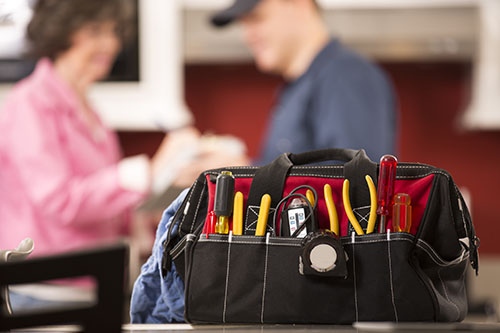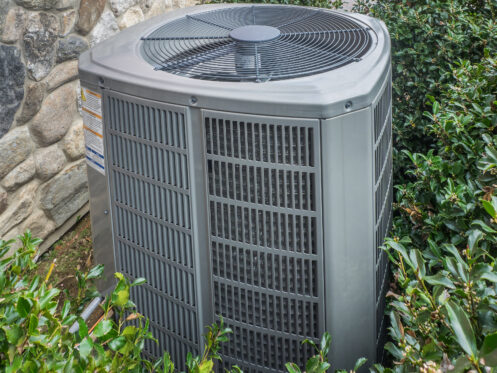When shopping for a new HVAC unit, picking the right size is essential. If you choose one that’s too small, it won’t be able to keep up with heating and cooling demands and will have to work overtime, leading to higher energy costs, a shorter lifespan, and reduced efficiency. On the other hand, if you go too big, then not only are you wasting money on an unnecessarily powerful system, but your home could become overly humid or dry. So how can homeowners narrow down their options? Below are different methods of sizing an HVAC unit for maximum climate control within your budget.
1. Measure the Square Footage of Your Home
Finding out the square footage of your home is the foundation of determining the right size HVAC unit for your space. To measure the square footage, you’ll need to calculate the length and width of each room in your home. Once you have that figure, multiply it by the ceiling height to get a room’s total cubic feet. Then add up all the rooms’ cubic feet to find out the overall square footage of your home.
Additionally, you may want to factor in the number of people living in your home. Higher occupancy levels mean more heat-generating bodies present, so you may need a bigger unit than the square footage alone dictates. Most HVAC units are classified by their tonnage, which is roughly equivalent to how much heat or cool air the system can generate per hour. With the measurements in hand and knowledge about the tonnage of each unit, you can find an HVAC system that fits your needs.
2. Consider Climate and Building Materials
The climatic conditions in your area and the type of materials used to construct your home will also play a role in deciding the right-size HVAC unit. For example, if you live in a cooler climate, you may need an extra-large system to keep up with heating demands. On the other hand, those living in warmer areas might require a slightly smaller unit because of the milder temperatures during certain times of the year.
Also, the type of building material used to construct your home can influence the size HVAC unit that you need. Brick, stone, and other masonry materials retain more heat than wood and plastic siding, meaning that a larger system will be required to keep up with cooling needs during the summer months.
Additionally, the design of your home will affect how much air needs to be circulated for optimal climate control. For instance, if your home has a lot of windows, you may need to invest in a bigger system since these openings allow a lot of the heat generated inside to escape.
3. Consider Energy Ratings and Noise Levels
Energy efficiency ratings are also important to remember as you make your decision. The higher the rating, the more efficient the unit will be, which means that it will use less energy and save you money on utility bills. Look for an Energy Star-certified model to get the most bang for your buck.
Another important factor to consider is noise levels. The last thing you want is a loud HVAC unit disrupting the peace in your home. Look for models with acoustic insulation or high-efficiency fans that lower the decibel level, and make sure that your unit has a warranty in case anything goes wrong. This will help ensure a longer lifespan, more efficient performance, and a quieter environment.
4. Consult With an HVAC Professional
Ultimately, the best way to select the right-size HVAC unit for your home is to consult an experienced professional. Certified specialists can look at all the factors, including climate, building materials, and energy ratings and determine which system is best for you.
Consult A HVAC Professional Today
Not only can they provide helpful advice, but qualified technicians can accurately install and maintain your new system so that it runs optimally year-round. This will help you save money in the long run on energy bills and gives you peace of mind knowing that your system’s performance won’t suffer because of improper sizing or installation errors. For Cheshire, CT residents and those in the neighboring areas, F.F. Hitchcock Plumbing, Heating & Cooling can provide the expertise you need to find an HVAC system that meets your budget and climate control needs.
5. Consider Your Budget and Warranty
While you might be tempted to go for the biggest and most expensive HVAC unit, remember that a larger system doesn’t necessarily mean better performance. Consider your budget and find a size that fits your financial constraints without sacrificing quality or efficiency.
Finally, don’t forget to look for a warranty when selecting your new HVAC system. Warranties depend on the manufacturer and type of HVAC unit, so read all the terms and conditions. A good warranty comes with things like free repair and replacement of parts, protection against malfunction caused by manufacturing defects, and more.

6. Determine the Type of HVAC System
There are three main types of HVAC systems: central air systems, ductless mini-split systems, and window units. Each has pros and cons depending on the size of your home, budget, and climate needs. Central air is the most efficient option for larger homes with multiple rooms. In contrast, mini-split systems are ideal for smaller spaces as they can be installed in individual rooms to provide localized heating and cooling.
Window units are good if you’re looking for an inexpensive solution, but they aren’t as energy efficient as the other two options since they tend to leak cold or hot air outside. Also, since these units must be taken down during winter, they won’t keep your home consistently comfortable year-round.
7. Read Reviews and Do Research
Getting opinions from people who have used or are currently using the product is always a great way to start your research. Look for online reviews from verified customers and consider their feedback before purchasing. Additionally, researching different models online can help you compare features and prices to find the best-size HVAC unit for your home.
Finally, consider getting an energy audit done by a professional as they can give you personalized advice on what system would work best for your specific needs. An energy audit not only helps you determine the right size but also identifies any potential problems with your existing system so that they can be resolved quickly.
8. Find Out the Heat-Generating Appliances in Your Home
These appliances can add substantial heat to your home and affect the overall cooling and heating needs. From your refrigerator to your oven, every appliance that you have can make a big difference in your HVAC unit’s size requirements.
It’s important to consider each appliance’s heat output and usage to select an HVAC unit that can keep up with your home’s cooling and heating demands. By taking a comprehensive approach and accounting for the impact of heat-generating appliances, you can ensure that your HVAC unit is the right size and works efficiently to provide maximum comfort.
Selecting the best-size HVAC unit for your home involves considering many different factors. From building materials to heat-generating appliances, looking at all the elements that can impact your system’s performance and energy usage is important. Additionally, consulting with an experienced professional and researching various models can help you make a more informed decision. By keeping these tips in mind, you can be sure to select a size HVAC unit that will provide years of reliable service while helping you save money on utility bills.
F.F. Hitchcock Plumbing, Heating & Cooling is a company that provides a wide range of air conditioning services, heating services, plumbing services, and energy conservation services, among others. Contact us now to get convenient scheduling options.








